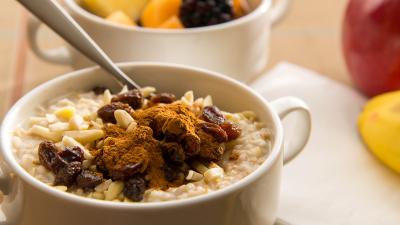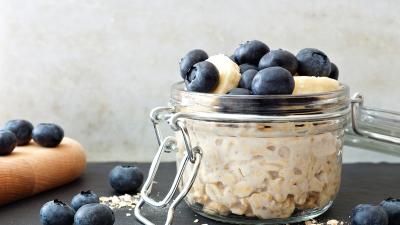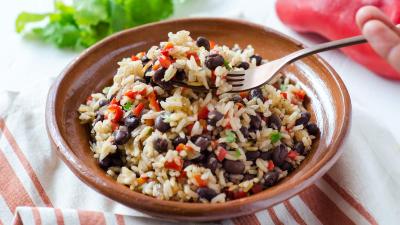Lowering Cholesterol With a Plant-Based Diet
Control Your Cholesterol and Prevent Heart Disease With a Plant-Based Diet
High cholesterol is a causal risk factor for heart disease. A plant-based diet is an effective way to optimize your cholesterol levels.
What is cholesterol?
Cholesterol is a waxlike substance produced by the liver that aids in building cell membranes and producing hormones. Our bodies produce plenty of cholesterol to meet our needs, so we don’t need to consume extra cholesterol through our diets.
What is the difference between HDL and LDL cholesterol?
Because cholesterol doesn’t dissolve in blood, it needs help to be transported through the bloodstream. Cholesterol is packed into two types of carriers: low-density lipoproteins (LDL) or high-density lipoproteins (HDL). LDL cholesterol, which is sometimes known as “bad cholesterol,” is necessary in limited quantities (LDL delivers cholesterol to various parts of the body), but high LDL cholesterol levels can dramatically increase your risk of a heart attack.1 That’s because LDL particles can contribute to atherosclerosis—or plaque formation in the arteries. HDL cholesterol—sometimes called “good cholesterol”—helps to clear LDL cholesterol from the arteries.
Factors that can negatively impact HDL include a diet high in saturated fat, smoking, alcohol intake, obesity, and lack of exercise.2 If you are hoping to increase HDL, vigorous exercise (start small and work up to 30 minutes per day five times per week) and adding omega-3 fats in place of saturated fats may help.
What is the ideal cholesterol level?
The American Heart Association (AHA) recommends that people should aim for a total cholesterol level below 150 mg/dL, with LDL cholesterol at or below 100 mg/dL.3 But “normal” cholesterol levels may not be enough. The Progression of Early Subclinical Atherosclerosis study found that approximately 50% of individuals with normal LDL cholesterol levels and no risk factors for heart disease had plaque buildup in their arteries as seen on ultrasound imaging.4
Research suggests that an LDL cholesterol of around 50-60 mg/dL offers the most protection against cardiovascular events, such as heart attacks.1 The AHA suggests that 70 mg/dL be used as a threshold for statin therapy for those with clinical coronary heart disease and for those at high risk, meaning that below 70 mg/dL should be the goal.5
Unfortunately, according to the Centers for Disease Control and Prevention, about 86 million U.S. adults 20 years or older have total cholesterol levels that are greater than 200 mg/dL, and nearly 25 million U.S. adults have total cholesterol levels above 240 mg/dL. The average cholesterol level of coronary artery disease victims is 225 mg/dL.6
Another important concept is lifetime cholesterol exposure. The longer we are exposed to elevated LDL cholesterol, the greater the build-up of plaque in our arteries, and the higher the risk of having a heart attack.7 Heart attacks don’t occur overnight due to a single elevated level of LDL cholesterol, but are rather due to atherosclerosis developing over years, largely as a result of poor diet and other lifestyle habits. In fact, the American Heart Association recommends that all people should get their cholesterol tested when they are in their 20s, and then every four to six years thereafter.8
Do we need to eat cholesterol?
Cholesterol has several important functions in our bodies, from forming part of our cell membranes to being used in the production of hormones and vitamin D. However, this does not mean that we need to eat cholesterol, as our liver can produce all the cholesterol we need. When we get more cholesterol in our diet, our liver downregulates the production of cholesterol, and when we get less cholesterol from our diet, our liver upregulates the production, ensuring we have enough cholesterol for all our body’s functions regardless of our dietary intake.
What diet is best for lowering cholesterol?
Studies have found that plant-based diets lower cholesterol levels more effectively than other diets. In 2017, researchers reviewed nine studies that compared plant-based diets with omnivorous diets to test their effects on cholesterol. Plant-based diets lowered total cholesterol, LDL, and HDL levels when compared to omnivorous diets. Low-fat, plant-based regimens typically reduce LDL levels by about 15-30%.9
Some recommendations for lowering cholesterol still include consuming chicken and fish. However, some studies have shown that heart disease patients who continue to eat these foods still tend to get worse over time. Those who adopt a low-fat, plant-based diet, exercise daily, avoid tobacco, and manage stress have the best chance of preventing and reversing heart disease.10
How can I lower my cholesterol naturally?
Avoid trans fats.
Trans fats are created when liquid oils are transformed into solid fats through a certain chemical process and are mainly found in ultra-processed processed and deep-fried foods. Trans fats are strongly linked to an increase in LDL cholesterol and an increased risk of cardiovascular disease. The World Health Organization recommends keeping them to below 1% of total daily energy intake.11 Trans fats are found in any food that lists hydrogenated or partially hydrogenated oil as an ingredient, as well as in small amounts in meat.
The Food and Drug Administration (FDA) banned the addition of artificial trans fats to food products in the U.S., as they are no longer recognized as safe for consumption. The main source of artificial trans fats in processed foods is partially hydrogenated oils, which the FDA has also banned. The FDA also now requires that trans fats be listed on the nutrition labels on food. However, when the amount of trans fats present is less than 0.5 grams per serving, it is listed as 0 grams per serving. Companies technically can reduce their serving size until the amount of trans fats is less than 0.5 grams per serving to get around this rule. Trans fats are also naturally found in small amounts in milk, butter, cheese, and meat. The best way to avoid trans fats in your diet, is to minimize ultra-processed foods, meat, and dairy, as well as to avoid foods that list “hydrogenated” or “partially hydrogenated” oil in their ingredients, which may be more commonly found outside of the U.S.
Reduce saturated fat.
Normally, the liver produces receptors on the cells which help to take up cholesterol from the blood. When we consume too much saturated fat, it prevents the liver from producing these receptors to help clear LDL cholesterol from the blood, and consequently the LDL cholesterol in our blood rises.12 The 2023 World Health Organization recommends keeping saturated fat intake to less than 10% of daily calories.13 Saturated fat is found in animal products and tropical oils, such as palm and coconut oil.
Eliminate cholesterol.
Between 29-80% of dietary cholesterol is absorbed from the gut.14 While it appears that each person has an individualized response, dietary cholesterol has been strongly linked to an increase in blood cholesterol.15,16 There is no need to consume cholesterol, which is found only in animal products.
Increase fiber.
Fiber, which is only found in plant foods, reduces the absorption of cholesterol from the gut, increases the amount of cholesterol excreted in the stool, and can reduce the amount of LDL cholesterol in the blood.17,18 Good sources of fiber include fruits, vegetables, legumes, and whole grains.
Replace animal protein with plant protein.
Replacing animal protein with plant protein has been linked to a lower LDL cholesterol.19 The link between plant protein and lower LDL cholesterol may be due to the phytonutrients and fiber found in sources of plant protein, or because increasing plant protein intake displaces animal protein, which is high in saturated fat and cholesterol.
Replace animal fat with plant-based sources of fat.
The Physicians Committee recommends a low-fat plant-based diet, keeping total fat to less than 10% of daily calories. Research has found that replacing saturated fat (found mainly in animal products and coconut and palm oil) with mono- and polyunsaturated fat (found in plant-based sources) lowers LDL cholesterol.20-22
Eat more soy.
Soy consumption has been found to reduce both total and LDL cholesterol, according to many randomized controlled trials.23-25 The isoflavones in soy may play a role in this cholesterol-lowering effect. Good sources of soy include tofu, tempeh, soy milk, and edamame.
Plant-Powered Prescription for Cholesterol
- Aim for at least 1/2 cup of beans daily to help meet your fiber goal.
- Aim to exercise for 150 minutes per week to improve your HDL cholesterol.
- Avoid ultra-processed food and trans fats.
- Replace animal protein with plant protein, including soy products such as tofu.
- Limit your daily fat to 10% of calories and get your fat exclusively from plant sources.
Soluble fiber traps cholesterol in the intestine and carries it out with the wastes. Four cholesterol lowering foods include oats, beans, barley, and soy products.
Dr. Neal Barnard
Foods That Lower Cholesterol Naturally
Did you know that people with high cholesterol can often experience dramatic improvement by eating certain foods?
Recipes To Lower Cholesterol
Cholesterol and Heart Disease
References
- Ference BA, Ginsberg HN, Graham I, et al. Low-density lipoproteins cause atherosclerotic cardiovascular disease. 1. Evidence from genetic, epidemiologic, and clinical studies. A consensus statement from the European Atherosclerosis Society Consensus Panel. Eur Heart J. 2017;38(32):2459-2472. doi:10.1093/eurheartj/ehx144
- Roussell MA, Kris-Etherton P. Effects of lifestyle interventions on high-density lipoprotein cholesterol levels. J Clin Lipidol. 2007;1(1):65-73. doi:10.1016/j.jacl.2007.02.005
- American Heart Association. What your cholesterol levels mean. February 16, 2024. Accessed March 26, 2024. https://www.heart.org/en/health-topics/cholesterol/about-cholesterol/what-your-cholesterol-levels-mean
- Fernández-Friera L, Fuster V, López-Melgar B, et al. Normal LDL-cholesterol levels are associated With subclinical atherosclerosis in the absence of risk factors [published correction appears in J Am Coll Cardiol. 2018;71(5):588-589]. J Am Coll Cardiol. 2017;70(24):2979-2991. doi:10.1016/j.jacc.2017.10.024
- Grundy SM, Stone NJ, Bailey AL, et al. 2018 AHA/ACC/AACVPR/AAPA/ABC/ACPM/ADA/AGS/APhA/ASPC/NLA/PCNA guideline on the management of blood cholesterol: executive summary: a report of the American College of Cardiology/American Heart Association task force on clinical practice guidelines [published correction appears in J Am Coll Cardiol. 2019 Jun 25;73(24):3234-3237]. J Am Coll Cardiol. 2019;73(24):3168-3209. doi:10.1016/j.jacc.2018.11.002
- Centers for Disease Control and Prevention. High cholesterol facts. May 15, 2023. Accessed February 12, 2024. https://www.cdc.gov/cholesterol/facts.htm
- Ference BA, Graham I, Tokgozoglu L, Catapano AL. Impact of lipids on cardiovascular health: JACC health promotion series. J Am Coll Cardiol. 2018;72(10):1141-1156. doi:10.1016/j.jacc.2018.06.046
- American Heart Association. How to get your cholesterol tested. February 19, 2024. Accessed March 26. 2024. https://www.heart.org/en/health-topics/cholesterol/how-to-get-your-cholesterol-tested#:~:text=How%20often%20should%20cholesterol%20be,as%20their%20risk%20remains%20low.
- Yokoyama Y, Levin SM, Barnard ND. Association between plant-based diets and plasma lipids: a systematic review and meta-analysis. Nutr Rev. 2017;75(9):683-698. doi:10.1093/nutrit/nux030
- Bergeron N, Chiu S, Williams PT, M King S, Krauss RM. Effects of red meat, white meat, and nonmeat protein sources on atherogenic lipoprotein measures in the context of low compared with high saturated fat intake: a randomized controlled trial. Am J Clin Nutr. 2019;110(1):24-33. doi:10.1093/ajcn/nqz035. Erratum in: Am J Clin Nutr. 2019 Sep 1;110(3):783.
- Reynolds AN, Hodson L, de Souza R, et al. World Health Organization. Saturated fat and trans-fat intakes and their replacement with other macronutrients: systematic review and meta-analysis of prospective observational studies. 2023. ISBN: 978-92-4-006166-8. https://www.who.int/publications/i/item/9789240061668
- Dietschy JM. Dietary fatty acids and the regulation of plasma low density lipoprotein cholesterol concentrations. J Nutr. 1998;128(2 Suppl):444S-448S. doi:10.1093/jn/128.2.444S
- Saturated fatty acid and trans-fatty acid intake for adults and children: WHO guideline. Geneva: World Health Organization; 2023. Licence: CC BY-NC-SA 3.0 IGO. https://www.who.int/publications/i/item/9789240073630
- Bosner MS, Lange LG, Stenson WF, Ostlund RE Jr. Percent cholesterol absorption in normal women and men quantified with dual stable isotopic tracers and negative ion mass spectrometry. J Lipid Res. 1999;40(2):302-308.
- Khalighi Sikaroudi M, Soltani S, Kolahdouz-Mohammadi R, et al. The responses of different dosages of egg consumption on blood lipid profile: an updated systematic review and meta-analysis of randomized clinical trials. J Food Biochem. 2020;44(8):e13263. doi:10.1111/jfbc.13263
- Zhao B, Gan L, Graubard BI, Männistö S, Albanes D, Huang J. Associations of dietary cholesterol, rerum cholesterol, and egg consumption with overall and cause-specific mortality: systematic review and updated meta-analysis. Circulation. 2022;145(20):1506-1520. doi:10.1161/CIRCULATIONAHA.121.057642
- Brown L, Rosner B, Willett WW, Sacks FM. Cholesterol-lowering effects of dietary fiber: a meta-analysis. Am J Clin Nutr. 1999;69(1):30-42. doi:10.1093/ajcn/69.1.30
- Schoeneck M, Iggman D. The effects of foods on LDL cholesterol levels: a systematic review of the accumulated evidence from systematic reviews and meta-analyses of randomized controlled trials. Nutr Metab Cardiovasc Dis. 2021;31(5):1325-1338. doi:10.1016/j.numecd.2020.12.032
- Li SS, Blanco Mejia S, Lytvyn L, et al. Effect of plant protein on blood lipids: a systematic review and meta-analysis of randomized controlled trials. J Am Heart Assoc. 2017;6(12):e006659. doi:10.1161/JAHA.117.006659
- Harris WS, Mozaffarian D, Rimm E, et al. Omega-6 fatty acids and risk for cardiovascular disease: a science advisory from the American Heart Association Nutrition Subcommittee of the Council on Nutrition, Physical Activity, and Metabolism; Council on Cardiovascular Nursing; and Council on Epidemiology and Prevention. Circulation. 2009;119(6):902-907. doi:10.1161/CIRCULATIONAHA.108.191627
- Mensink RP, Zock PL, Kester AD, Katan MB. Effects of dietary fatty acids and carbohydrates on the ratio of serum total to HDL cholesterol and on serum lipids and apolipoproteins: a meta-analysis of 60 controlled trials. Am J Clin Nutr. 2003;77(5):1146-1155. doi:10.1093/ajcn/77.5.1146
- Mensink RP. Effects of saturated fatty acids on serum lipids and lipoproteins: a systematic review and regression analysis. Geneva (Switzerland): World Health Organization; 2016. Accessed March 26, 2024. https://iris.who.int/bitstream/handle/10665/246104/9789241565349-eng.pdf
- Taku K, Umegaki K, Sato Y, Taki Y, Endoh K, Watanabe S. Soy isoflavones lower serum total and LDL cholesterol in humans: a meta-analysis of 11 randomized controlled trials. Am J Clin Nutr. 2007;85(4):1148-1156. doi:10.1093/ajcn/85.4.1148. Erratum in: Am J Clin Nutr. 2007;86(3):809.
- Zhan S, Ho SC. Meta-analysis of the effects of soy protein containing isoflavones on the lipid profile. Am J Clin Nutr. 2005;81(2):397-408. doi:10.1093/ajcn.81.2.397
- Moradi M, Daneshzad E, Azadbakht L. The effects of isolated soy protein, isolated soy isoflavones and soy protein containing isoflavones on serum lipids in postmenopausal women: a systematic review and meta-analysis. Crit Rev Food Sci Nutr. 2020;60(20):3414-3428. doi:10.1080/10408398.2019.1689097









